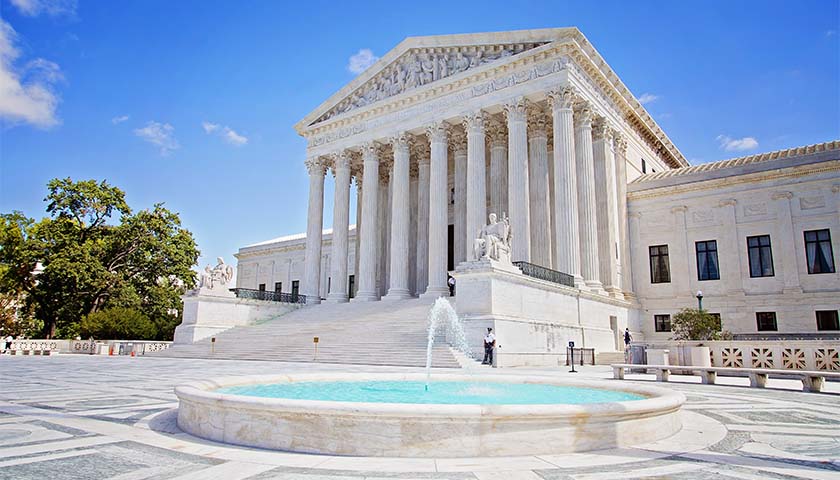by Casey Harper
The U.S. Supreme Court heard oral arguments Tuesday in a major immigration case, one of several key legal battles working their way through the federal judicial system as illegal immigration soars.
In Biden v. Texas, the attorneys general of Missouri and Texas sued after the Biden administration ended the Migrant Protection Protocols (MPP), also known as the “Remain in Mexico” policy.
The Department of Homeland Security began the MPP in 2019 under President Donald Trump. It tasks agents with returning illegal immigrants seeking asylum to Mexico as they work their way through the U.S. legal system.
On his first day in office, the Biden administration announced it would no longer carry out the program. The administration argued the policy in question was inhumane, strained the U.S. relationship with Mexico, and created chaos. Texas and Missouri argued the administration’s plan is more chaotic and hurts the American public by releasing thousands of illegal immigrants into U.S. communities.
The federal government argued it needs Mexico’s cooperation to carry out the policy, which ties its hands.
In a news conference after oral arguments, Texas Attorney General Ken Paxton rebuffed that claim, pointing out the Trump administration was able to successfully work with Mexico to quickly deport migrants.
“This is a really important case… In my opinion, we’ve all become border states. It affects all of us,” Paxton said.
Since Biden took office, illegal immigration has soared, raising more concerns about the president’s policies. Border Patrol reported more than 2 million encounters with people crossing the southern border illegally in 2021. Those numbers remain elevated this year.
“In total, there were 221,303 encounters along the southwest land border in March, a 33 percent increase compared to February,” U.S. Customs and Border Protection reported earlier this month. “Of those, 28 percent involved individuals who had at least one prior encounter in the previous 12 months, compared to an average one-year re-encounter rate of 14 percent for FY2014-2019.”
U.S. District Judge Matthew J. Kacsmaryk of the Northern District of Texas ruled in August that the Biden administration must reinstate the MPP, saying they violated federal law by discontinuing it. In August, the Supreme Court said it would not immediately overturn that order.
“The applicants have failed to show a likelihood of success on the claim that the memorandum rescinding the Migrant Protection Protocols was not arbitrary and capricious,” that order read.
But the case was back before the nation’s highest court Tuesday.
During oral arguments, the justices grilled both sides and questioned the public benefit of releasing illegal immigrants into the U.S. and the process used by the Department of Homeland Security to evaluate and release migrants. They also raised concerns about funding, asking what else could be done if DHS does not have the resources to detain migrants and Mexico is hesitant to take them back.
The federal government stressed that it did not have the room to detain the hundreds of thousands of migrants encountered at the border every month.
“So you agree that Congress has expressed a preference for detention when that is available,” Justice Brett Kavanaugh asked the federal government’s attorney, to which she agreed.
Supporters of the Biden administration’s policy change argued it was more humane to migrants.
“For over three years, MPP has forced thousands of asylum seekers to wait for their asylum hearings in dangerous border towns, subjecting them to systemic danger and violence,” said Joan Rosenhauer, executive director of Jesuit Refugee Service. “JRS works directly with people in northern Mexico as they await their opportunity to pursue asylum and find safety in the U.S. We hear every day of the violence and suffering they experience.”
Biden also has taken fire for his decision to end Title 42 enforcement May 23. A Trump-era provision, Title 42 allows border agents to quickly expel illegal immigrants to prevent the spread of COVID-19 into the U.S. A federal judge on Monday blocked his lifting of that provision.
“I view Missouri as a proxy for all the others states impacted by the crisis we have at the border,” Missouri Attorney General Eric Schmitt said. “Today, this is a central question about the rule of law and border security. We are very hopeful for a positive decision and result here.
“The drug trafficking, human trafficking doesn’t stop in El Paso,” he added.
– – –
Casey Harper is a Senior Reporter for the Washington, D.C. Bureau. He previously worked for The Daily Caller, The Hill, and Sinclair Broadcast Group. A graduate of Hillsdale College, Casey’s work has also appeared in Fox News, Fox Business, and USA Today.





